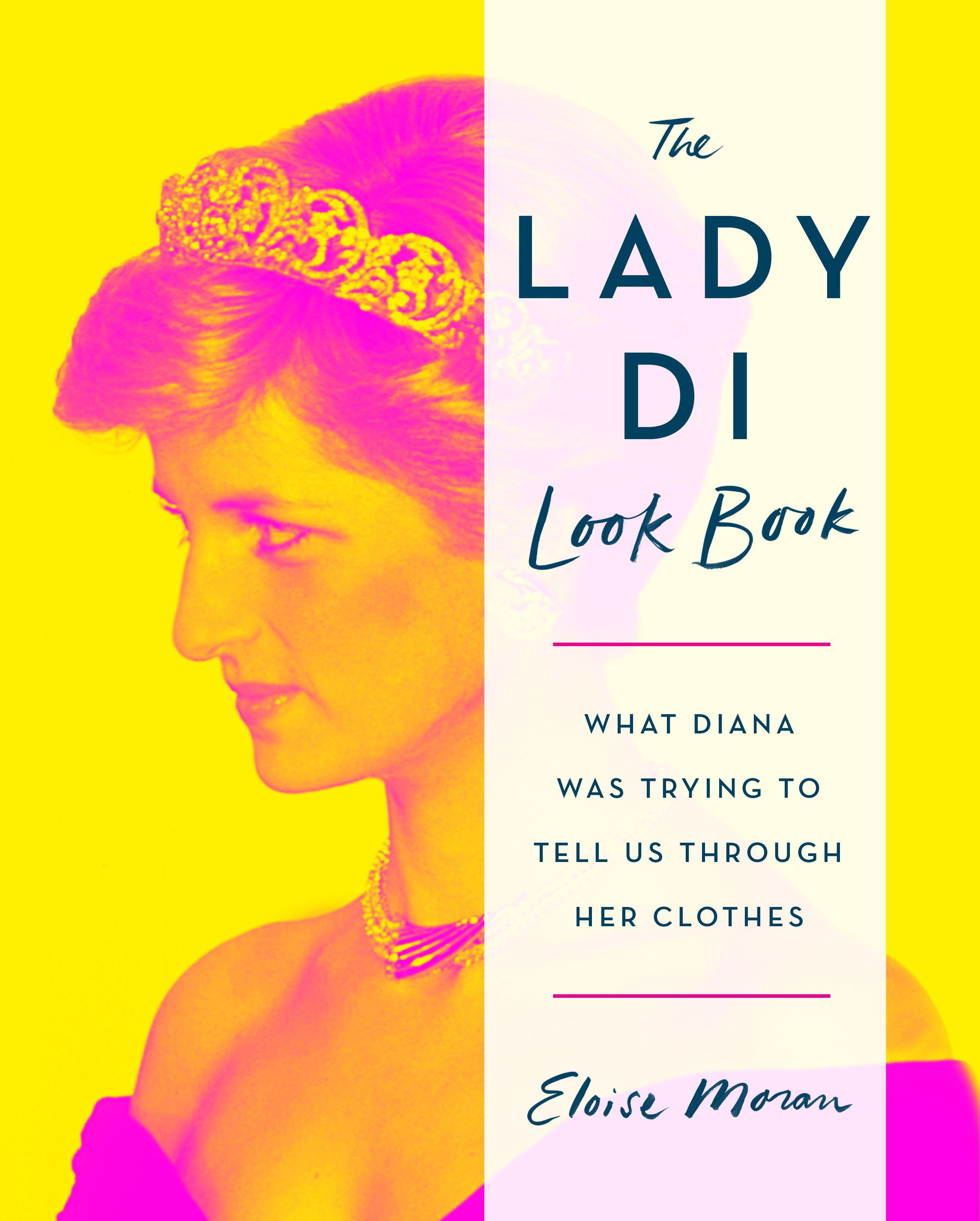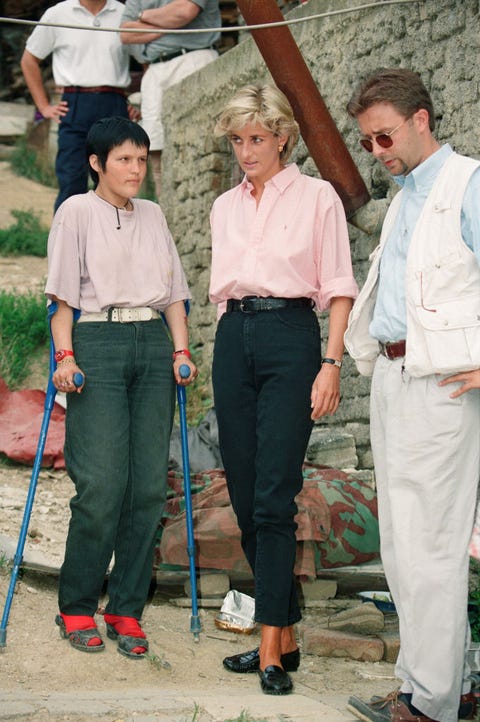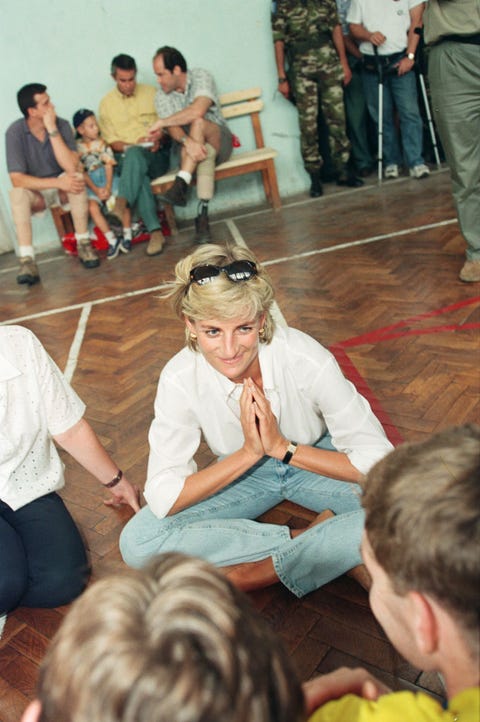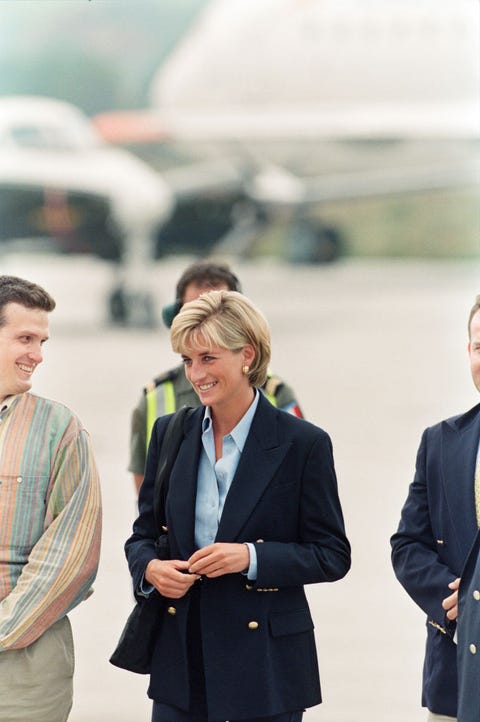I was only five years old when Princess Diana died. My memory of her death—and life—is very limited. But I remember watching her funeral on an old box television at my next-door neighbor’s house in London. I can still recall my mother and our elderly neighbor’s tears, and the sea of bouquets spread out in front of the gates of Buckingham Palace. I thought that perhaps my mother, and the thousands lining the streets of the funeral procession all knew this woman personally. Of course, they didn’t; yet, they all mourned her. Some even mourned her like family.
It wasn’t until 2018, when I was living in New York, that I was reintroduced to Princess Diana in a way I hadn’t anticipated. I was 26 years old, and my marriage, something I entered into far too flippantly when I was just 21, was ending. At the time, my knowledge of Diana’s life was vague, but this changed when I watched a documentary about her, and felt inexplicably connected to the princess. Like me, Diana married young, albeit under circumstances that I could hardly imagine. She, too, entered into her marriage with great hope. She believed she was in love, and with a prince! I began the Instagram account @ladydirevengelooks, which was intended to be an archive of Diana’s best post-divorce looks paired with playful, slightly irreverent captions (low-key directed at my own ex, of course).
At the age of 19, Diana had barely had any time to get to know herself. She was passed from one aristocratic family to another—the “sacrificial lamb,” as she herself put it. As the future Queen Consort, Diana was expected to do two things: look the part and stand both figuratively and physically behind her husband, Prince Charles. Of course, what the Palace had not expected was that this meek, insecure woman would grow up. Amidst mental health struggles, breakdowns, and private battles with bulimia—she’d slowly begin to understand herself, what she had to offer, and most importantly, who she wanted to be.
The media’s “clotheshorse” also realized that while people weren’t listening, they sure were watching, and if everyone was looking so closely and dissecting every detail, then perhaps she would find a way to communicate and carve out her independence through her style. Diana’s uncontainable spirit became more present throughout the eighties; through the dazzling sequins of her Dynasty Di era, the rebellious black leather and punkish blue eyeliner worn to rock concerts, and the tongue-in-cheek slogan knits that spoke so very loud against her coy demeanor. Then there were the side-eye glances and eye-rolls behind Prince Charles’s back that said it all. Stripped of her voice prematurely, it soon became clear—this was not the type of woman who felt comfortable fading into the background.
Diana’s many style metamorphoses have since been memorialized by a younger generation, who, like me, were too young to remember Diana first-hand. Brands like Ganni revisit Diana’s ’80s Peter Pan and Chelsea collars, while Rowing Blazers successfully resuscitated the princess’ favorite knitwear brands by reissuing her infamous black sheep sweater from Warm & Wonderful, and the “I’m a Luxury” sweater from witty knit label Gyles & George.
Across Instagram and Tiktok, the style tributes to Diana are unceasing, and her athleisure looks have become synonymous with our generation. But it’s the lesser-known looks, the outfits she wore zipping around town, that are significant in their own way and what urged me to start my Instagram account to begin with. They are the looks that put the focus on where she was headed, her authentic sense of style, and the brave path she was determined to pursue.
Through each transformative style era—from the frills and florals of an ’80s fairytale princess to the clean lines and Dior suits of a ’90s ambassadorial career woman—perhaps the most stripped back we see Diana, and her wardrobe, is during August 1997, the final month of her life. She’d auctioned off 79 of her dresses at Christie’s New York just a month before, and for humanitarian missions to Angola and Bosnia and Herzegovina she welcomed crisp Ralph Lauren button-downs and straight-leg jeans, styled with elegant oval sunglasses and Tod’s driving moccasins. Perfect for the woman who wanted her work, rather than her outfits, to stand center stage.
Afterwards, she joined her new boyfriend, Dodi Al-Fayed, on his father’s superyacht in Saint-Tropez. It was her second vacation with the Egyptian film producer that summer. As she bronzed herself on the deck and openly embraced with her summer fling, her rainbow of swimsuits by brands Jantzen and Gottex added a splash of color to the glistening azure of the Mediterranean Sea. But of course, it was the woman wearing these statement suits and her beaming smile that stood out the most. Finally, she looked at peace. The world watched as she perched alone on a diving board in an aquamarine bathing suit, in a now famous image that captures an apparent moment of solitary reflection for the princess—away from the frenzy and furor of the paparazzi that would once again await her on her final trip to Paris.
The haunting last images we have of Diana are mostly from grainy footage captured from The Ritz’s CCTV. Insinuating the vacation was over, Diana began her final day on Aug. 30 in a gray business suit, and ended it, after dinner in a private suite at the Ritz, in a utilitarian look: a simple black blazer and white jeans. It was a typical outfit for the princess who was surely ready to get home to her boys, and eager to get back to her role. She had so much work to do.
Then, the accident. The funeral, followed by the fury. A feeling that still lingers that we as a society could have done so much better for this woman had we listened to her, had we heard her cries for privacy, had we demanded her protection from the press. What if we had not just assumed a fairy tale ending for her? In his eulogy, Diana’s brother, Earl Spencer, noted, “Of all the ironies about Diana, perhaps the greatest was this: a girl given the name of the ancient goddess of hunting, was in the end, the most hunted person of the modern age.” She was tossed around, tested, and ultimately thrown to the wolves. How can we not help but wonder: had there been true value placed on her life instead of entertainment value, that perhaps she could have been saved. Would this very human woman who cared so deeply for others still be alive today had she not been so dehumanized?
The tale of Diana is a tragedy, but especially to women. Once admired simply for her clothing, she alone made the world hungry for her words and actions, and in her final month, stepping back from the frocks, the glamour and the excess, she was louder than ever; she was herself. Twenty-five years on, we can still take inspiration from Diana’s story; it is, after all, one of immense growth and strength.
We must also ask ourselves if the patriarchal formula that sold millions of newspapers at her expense still exists today. Perhaps the reason why a whole new generation looks to Diana with such tenderness (other than the obvious admiration for her clothing) is because her story is still relevant. Prominent women are still hounded by photographers, misogyny still sells tabloid newspapers, and female bodies are still dissected at humiliating lengths. Has much really changed? The anniversary of Diana’s death is a stark reminder that we still have so much work to do.
Eloise Moran is a London-born, Los Angeles-based fashion writer and creator of the Instagram account @ladydirevengelooks, which has been featured in The New Yorker, ELLE, The LA Times, and The Telegraph. She currently lives on the east side of LA with an impressive collection of nineties clothing—including her most prized possession: an original Virgin Atlantic Sweatshirt which was seen on Lady Diana herself. The Lady Di Look Book is Eloise’s first book.



